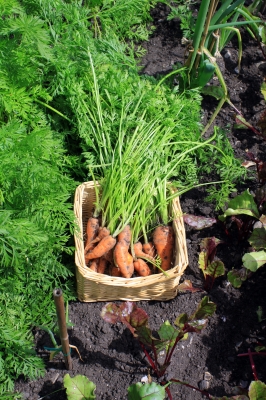Modern life affords us the luxury of buying food grown by others rather than having to grow our own. However, periodically, despite the ability to take the easy way out and just obtain our food from a grocery, we prefer the do it yourself method of obtaining our food. Regularly there is a mass movement back to home gardening usually prompted by a sudden rise in food prices or increased worry over food safety.

There are any number of reasons why individuals become interested in growing their own food; below are some of the most common.
Reasons To Grow Your Own Food
Saving Money – Probably the number one reason people take the plunge but can people grow enough food to make it worth their effort? It all depends on what you choose to put in your garden. Some vegetables such as celery take too much time and trouble to make it worth the effort from a monetary standpoint but others such as zucchini, which grows almost overnight and can be quite costly at the store, makes perfect sense.
Health – Many people worry about the pesticides, herbicides and commercial fertilizers used by large food producers. Additionally, there is the concern over E.coli and other pathogens that can be found on fresh produce that is not properly grown and handled.
Environmental Concerns – Home grown produce is the ultimate locally grown food and environmentally conscious prefer local food because it reduces the use of fossil fuels in transportation. They also object to the use of pesticides and other pollutants entering our water supply a factor they can control when they grow their own food.
Exercise – Gardening is good exercise; how vigorous an exercise it is depends on the type and scope of gardening in which you choose to indulge.
Self-Sufficiency – Those who worry about the downfall of civilization or who simply hate the thought of needing it to fulfill their needs take up gardening to increase their independence. Regardless of whether you think being prepared for the unexpected is worthwhile or not, most people can benefit just from being able to grow extra produce and then share it, or dehydrate and store it for later.
Empowerment/Mental Health – For many growing their own food means taking charge of their life and knowing they can provide for themselves on the most basic of levels. It is also promotes good mental health by providing a conduit to nature and the small miracles all around us.
Common Beginner Mistakes
- Taking on too much
- Lack of preparation
- Pests
One of the first mistakes novice gardeners make is trying to do too much their first year. For the first year garden, it is wise to limit the number of vegetables grown as well as the overall size of the garden. Three or four vegetables make a good start.
In addition, the first year a vegetable is grown it is best to only plant enough with summer eating in mind. If all goes well you can plant enough for the freezer or for canning the following year. Another common mistake is not preparing the soil sufficiently before planting. For a good garden, soil needs turning over and loosening up to a depth of two feet. Finally, pests likely to attack need to be identified and a plan of defense decided upon well in advance of their arrival.